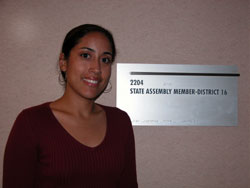Berkeleyan
Social work in the real world
For students in the School of Social Welfare’s top-tier grad program, field placements bring their classroom studies to life
![]()
| 21 January 2004
| |  Through her internship in the Oakland office of Wilma Chan, California Assembly majority leader, School of Social Welfare grad student Laura Jiménez is acquiring insight into the 24/7 life of a lawmaker. Jiménez is interested in varied aspects of public policy — and a possible career in politics. Cathy Cockrell photo |
Supervised field-work placements, supported by discussion seminars, are hallmarks of the graduate curriculum at Berkeley’s School of Social Welfare (SSW). The school’s 60-year-old master’s program, with its close marriage of academic training and direct experience, is consistently rated among the nation’s best; US News & World Report recently ranked it third out of 156 programs nationwide, and first in research productivity.
Experiential learning figures prominently in the school’s curriculum. With field work accounting for close to half the units required to earn a master’s degree, SSW students fan out to scores of Bay Area organizations, where they collectively contribute more than 100,000 hours each year to public and private programs.
Traditional counseling work with clients accounts for many of those hours, but over the last decade SSW has increasingly emphasized public-sector agencies serving disadvantaged clients, says Adjunct Professor Bart Grossman, director of field instruction. To perform field work in these settings can be “very demanding and intense,” he notes, but also an invaluable preparation for social-work practice “in the real world.”
One cohort of students, for instance, receives federal/state stipends in exchange for a commitment to work in public child-welfare agencies for at least two years. These agencies have a history of high employee turnover — in part, says lecturer Catherine Ralph, these students’ field-work seminar leader, because new social workers “would bring idealism and enthusiasm but no sense of what they were undertaking.”
An 18-year veteran in the field and a 1977 SSW alumna, Ralph uses classroom discussions to arm her students with realistic expectations and tools for sustaining their commitment. In that way, she says, they’re more prepared for what they’ll encounter in the child-welfare arena and “much less vulnerable to feeling disappointed.”
During Briana Lewis’ first year in this stipend program, the school helped place the MSW candidate in the Santa Clara County district attorney’s office, where she did psychosocial evaluations of children under court guardianship and observed the workings of the family-law system first hand. For better or for worse, child-welfare work is deeply entangled with the courts, so the internship turned out to be “an amazing opportunity,” she says. “It normally would have taken me years and years to be able to work for a DA.”
Kelly Tobin-Glazer — who is interested in counseling as well as planning and managing services for the elderly — echoes Lewis’ enthusiasm, using adjectives like “phenomenal” and “in depth” to describe her particular graduate experience. Through her current placement at San Francisco’s Institute on Aging, Tobin-Glazer counsels elders who have been abused, staffs a suicide-prevention hotline, shadows a program director, and gets two hours a week of supervision from professionals in the field. “It hits all my interests, so it exceeds my expectations,” she says.
Starting where the client is
Having emphasized field work for so long, SSW has ongoing relationships with many Bay Area organizations and agencies — but is always looking for innovative new placements, as well, says James Midgely, dean of social welfare. Over the past few years, for example, it has teamed up with faith-based organizations such as Allen Temple Baptist Church, Oakland’s largest Baptist congregation — a collaboration that received one of the campus’s 2003 University/Community Partnership awards.
This fall, first-year grad student Ken Eisinger began leading a group at Allen Temple on anger management for ex-offenders. “I go to class on Tuesday to learn social-work theory, frameworks, models, and interventions,” he says, “put that into practice on Wednesdays, and come back to my seminar on Thursday to process frustrations and success with classmates.”
Eisinger hopes to augment his exposure to “the nuts-and-bolts practical realities of social work” with additional research-based academic study.
“It’s important to have a balance,” he thinks; already the combination of theory and first-hand experience SSW offers has served him well. “I learned in class that you have to start where the client is; you can’t come in with preconceived notions. If I have a group where some clients are adept at dealing with their anger but some are in complete denial, I need to tailor the lesson to people in different places.”
In the legislative arena
The school also offers rare field-work placements in state and federal legislative
offices. It’s been doing so for some time. U.S. Representative Barbara
Lee (D-Calif.), a 1975 SSW graduate, worked in the Ninth District office
of former Representative Ron Dellums — whose congressional seat she now
holds; another alum interned with former Assemblywoman Dion Aroner.
Former Peace Corps volunteer Laura Jiménez is continuing the tradition. The 27-year-old student is interested in issues like access to education, in “creating, implementing, and analyzing policy,” and a possible career in politics.
Working in the local office of Assembly Majority Leader Wilma Chan, Jiménez is acquiring — among other things — insight into the day-to-day life of a policymaker.
“It’s a 24-7 job,” she observes. Whether or not she takes the plunge into politics, SSW’s policy and management specialization, and her field work in Chan’s office, have armed her with experience, she says, in each of her areas of interest.
The school has nurtured ongoing partnerships with hundreds of agencies and social-work professionals. As a result, students like Jiménez are able to get first-hand experience, prior to graduation, in settings matched closely with their interests — while benefiting from, and contributing to, the quality of social services in California.

